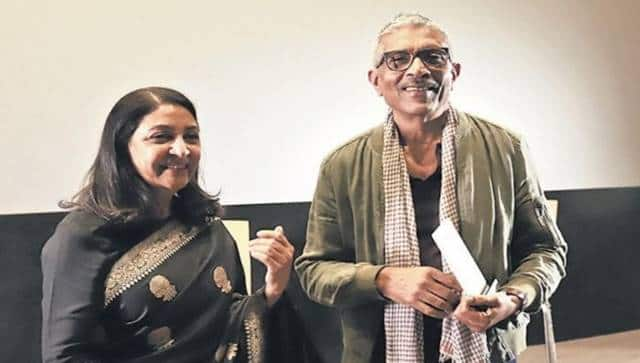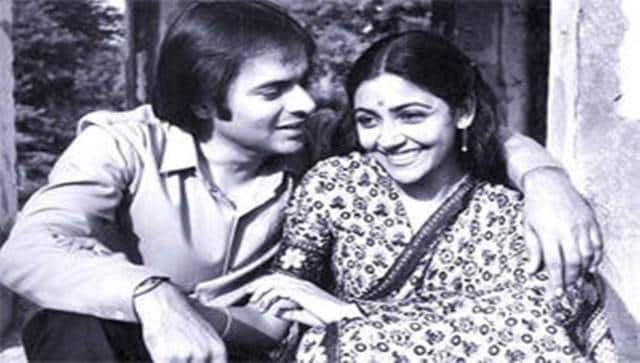Not one to tom-tom her achievements, Deepti Naval has been in some of the most beloved state-of-the-art Hindi films of the 1980s including Vinod Pande’s Ek Baar Phir where Deepti played the neglected wife who goes out to have a roaring extra-marital affair. The two Sai Paranjpye films Chashme Buddoor and Katha made Deepti a household name, though not in the same way as Hema Malini. Deepti never aspired to be Hema Malini. Her selection of roles reflects a deep affinity to neo-realism. Raman Kumar’s Saath Saath was the film that most eloquently typifies Deepti’s aspirations as an actor. The end of idealism and the beginning of compromise sometimes indicate the culmination of many creative pursuits. One such was Raman Kumar’s small, slender but immensely large-hearted 1982 film. Saath Saath featured Farooq Sheikh as an idealist whose visions crumble as his wife Deepti Naval watches her husband’s dreams turn to dust. It is a genuine work of art comparable with the best coming-of-age end-of-idealism films that came out of the Mumbai film industry between Hrishikesh Mukherjee’s Satyakam in 1969 and Sudhir Mishra’s Hazaaron Khwaishein Aisi in 2005. Free-willed intelligent and independent Deepti preferred not to play docile women. But then life doesn’t offer an avant-garde actress many choices. And Deepti sometimes ended up doing regressive roles. In an interview with me in 2003 Deepti had said, “I am a seriously independent woman and I want people to know that. I played the submissive wife in Shakti because I needed the money. But I’m glad I did. Somehow, I have always chosen roles that require me to be repressed. Those women are so alien to me. I have never faced male oppression. But these are intrinsically strong characters stymied by circumstances. As an individual, I am fiercely independent. I have always thrown away the safe option.” Married to filmmaker Prakash Jha in 1985, they parted ways in 1982 but continued to be connected for their adoptive daughter Disha. Soon after Deepti found true love in Vinod Pandit (actor, and classical vocalist Pandit Jasraj’s nephew) whom she lost to cancer. [caption id=“attachment_10345491” align=“alignnone” width=“640”]  Deepti Naval with Prakash Jha[/caption] Deepti spoke to me about her love and loss. “I was completely tied down in my relationship with Vinod Pandit. Even when he fell ill with cancer he brought out the best in me. After he came into my life, I had my first painting exhibition. He also encouraged me to resume photography and to write. He played my husband in my serial Thodasa Aasman. Vinod and I traveled together often. We would go off to the hills of New York. I think I was running away from doing roles like Guddu (where I played Shah Rukh Khan’s mother). I was in love. He was just as adventurous as me. We would earn some money, spend it on a holiday and come back again. We were engaged for years. We were scared to marry, we didn’t want the romance to die out. We both had gone through failed marriages. I had to return to acting to pay for the hospital bills.” She was highly critical of the objectification of women in Hindi cinema: “The dances and body language are so provocative. Women are heaving their breasts in men’s noses and choking them with their bosoms. And they aren’t considered vulgar. I would rather do a straight love scene than have my assets hanging over some man’s face.” In 2009, Deepti turned director with a beautiful film Do Paise Ki Dhoop Chaar Aane Ki Baarish, a film about the relationship among three characters, one of whom happens to be a little boy. It featured Deepti’s best friend Manisha Koirala as a scarred sex worker. Deepti initially wanted a far earthier actress for Do Paise Ki Dhoop.“The character couldn’t be as pretty as Manisha. I thought of Sonali Kulkarni who’s a wonderful actress and also very beautiful in her way and just right for my film. But then Manisha with her ethereal beauty seemed a bigger challenge. Besides, she’s also a close friend. She has taken pains to make sure her intrinsic beauty is diminished in my film." [caption id=“attachment_10345481” align=“alignnone” width=“640”]  Deepti Naval with Farooq Sheikh[/caption] However, Deepti’s passport to fame remains Chashme Buddoor. Audiences who perhaps were not even born when Farooq Shaikh and Deepti Naval captivated a whole generation of moviegoers with their unaffected camaraderie, get a chance to see why the movies in the 1970s and 80s by Hrishikesh Mukherjee, Basu Chatterjee, and Sai Paranjpye were considered heartwarming windows into the soul of the middle-class. Chashme Buddoor harks back to that era of innocence when college students chased girls all across town hoping to get them to agree to a coffee or a movie. Sex, if at all, was never discussed. The gently clever plot of Sai’s film could be divided into three movements. In the first movement Rakesh Bedi and Ravi Baswani playing despicably deceptive pals to the relatively sober Farooq Shaikh, cook up an elaborate fantasy romance with the girl next door Deepti Naval. In the second movement, the devilish duo tries to mess up Shaikh’s romance with Deepti. And in the third and final movement, Bedi and Baswani desperately try to reconcile the lovers. The narrative is strewn with a warm bonhomie that suggests a sense of equilibrium in the universe even when human intentions are far from legitimate or sensible. What works wonderfully for Sai Paranjpye’s game-plan are the credible actors, each embracing his or her character with the conviction of permanent ownership. Farooq and Deepti are as convincing as a couple as any two strangers who decide to forge a relationship probably because they haven’t met too many potential soul-mates to choose from. Baswani and Bedi’s roguishness bolsters the plot’s action forward into a logical finale. Incredibly the Farooq-Baswani-Bedi trio smokes all through the film. There is hardly a frame where one or all three are not seen puffing away at the cancer stick. Perhaps this is a sign of those relatively innocent times when youngsters smoked because they thought they looked cool doing so. While most of the episodes still hold up with edifying momentum some of what seemed cleverly innovative 30 years now seems only to be self-indulgent. There’s an elaborate song in a park where Farooq and Deepti wonder how couples in films manage to sing loudly in public places. Then they proceed to do the same to the accompaniment of sniggers from onlookers. Offbeat or middle-of-the-road filmmakers always demonstrated discomfort with conventions of mainstream cinema. Were they just genuinely disdainful of the potboiler or cloaking in snobbery their inability to cope with conventional ingredients? In Chashme Buddoor Sai Paranjpye ably straddles the two worlds of a superior intellectual projection of cinematic conventions and mass entertainment. And yes, there is a cameo by the Big B and Rekha where he courts the girl by pretending to have found her handkerchief. This was the 1980s. No one could escape the Bachchan trap. Not even Sai Paranjpye who made the art of ladki patana look decent. Even when the protagonists used cheesy pickup lines they were never offensive. Those were innocent times. A waiter is shown to become privy to Farooq’s courtship with Deepti. It’s the waiter who announces intervals in the film. Characters in this film are allowed to be clever even at the cost of crossing the camera range. It’s a world of cerebral satire where lovers avoid being filmy but don’t mind if their togetherness suggests an affinity with screen couples who woo one another with songs and poetry. Chashme Baddoor is a world free of pain. Though the characters inhabit the middle-income group they are untouched by suffering. No one dies in Chashme Baddoor. Not even while laughing. There is no ‘LOL’ moment in Sai’s scheme of humour. We smile because the sound of loud laughter doesn’t suit this film’s purposes. Deepti misses her favourite co-star Farouq Shaikh: “We worked together for the first time in ‘Chashme Buddoor’, and we did 7-8 films together after that. Of these, my favourite films are ‘Chashme Buddoor’, ‘Saath Saath’ and ‘Listen…Amaya’.Sai Paranjpye, Rakesh Bedi, Ravi Baswani, Saeed Jaffrey, and I… What a team it was! We made a film that just happened. We were all having so much fun while making it. On a flight, I saw the ‘Chashme Buddoor’ remake. It did nothing to me. It had no impact. Watching the remake, I missed the original team even more. We miss Deepti Naval on screen. Her serene presence reminds me of Waheeda Rehman. They share the same birthday and a tragic romantic past.
Subhash K Jha is a Patna-based film critic who has been writing about Bollywood for long enough to know the industry inside out. He tweets at @SubhashK_Jha.


)
)
)
)
)
)
)
)
)



